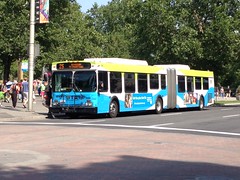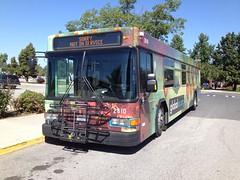A Bus Route to Connell?
Posted: February 20, 2012 Filed under: Transit 4 CommentsBack when BFT was first established in 1981, it was the first Public Transportation Benefit Area (PBTA) in Washington State to stretch across two different counties, Benton and Franklin (which led to the name of “Ben Franklin Transit” for the agency). In Benton County, the PBTA covers the majority of the county’s population centers, with the exception of Paterson and Plymouth in the south part of the county (across the river from Oregon). Over in Franklin County, it’s a different story, with only the city of Pasco and a small part of unincorporated county (including the “doughnut holes” within Pasco) being covered. Though there are several communities in the northern part of the county, the most desperate for an intercity bus link is Connell.
Home to 5,510 (according to the Washington State Office of Financial Management’s 2011 estimate; 2010 Census calculated a population of 4,209), Connell is the biggest city in Franklin County after Pasco. Just like most Eastern Washington cities it holds roots in an agricultural history, but today it is perhaps best known as the home of Coyote Ridge Correctional Facility, the largest prison facility in Washington State. The jail itself can house some 2600 inmates, with a workforce of about 650 supporting the facility (guards, custodial, etc). Currently, transit doesn’t have much of a presence in Connell. There are a number of BFT vanpools that go to Coyote Ridge from the Tri-Cities, but those are only available to the employees using them. Before 2004, Greyhound had a stop in Connell, but that was cut out as part of a massive stop/route deletion effort undertaken that year while Greyhound struggled to return to probability in the post-9/11 economy. The bus that once stopped there still runs by on Highway 395 twice a day (once in each direction), but the occasional calls to reinstate the stop have gained little attention.
Having seen the resounding success of the recently launched Yakima-Ellensburg Commuter (talked about previously here and here and here), I thought it would be interesting to look further into what the route might look like, the sort of schedule that would be feasible, and the resources it would take to institute the service.
At the south end, the route would be anchored to the Tri-Cities at 22nd Ave Transit Center in Pasco. From 22nd Ave TC, the bus would head up 20th Ave and head straight onto Interstate 182, and then head north along Highway 395. While enroute to Connell, the bus would pass by Eltopia and Mesa, both small towns directly adjacent to the highway. The towns don’t have very large populations, so I think one option to serve the communities would be with a demand-response system, with the bus only stopping in the towns if someone calls and requests it. Once the bus arrives in Connell, it would take the exit for State Highway 260, and then head west into town. At Columbia Ave, the bus would turn right and head north. (As Columbia Ave was recently reconstructed and had sidewalks put in, this would be the best street for a bus to travel on. It also doesn’t hurt that Columbia Ave is the city’s main thoroughfare.) At the north end of town, the bus would turn right off Columbia Ave and head up Davis Way, which would bring the bus directly to Coyote Ridge. (To visualize this, I drew the route here on Google Maps with the markers showing stop locations; no stops in Eltopia are shown.)
For a schedule, we can look at the precedent that has been set by Route 170, which connects the Tri-Cities to Benton City and Prosser. That route runs an hour in each direction, making it have a 2-hr headway, which is adequate for the demand of that route. The Tri-Cities to Connell route would also run this way, taking an hour to travel in each direction and having a 2-hr headway. Since running time may become a bit of an issue, particularly if a stop has been requested in Eltopia or Mesa, it could be set up so that the bus stops by request only. For example, if there were no riders on a northbound trip that needed to disembark at a stop in town, the bus could bypass downtown and head straight to Coyote Ridge. (The bus would still run through town on the southbound trip). This scenario would most likely be the best option, as it would keep the route within the time constraints while still leaving enough “padding” in the schedule.(Again, the route is visualized here on Google Maps.) For Mesa, a couple options to consider including having a scheduled stop for northbound only and then by request on southbound, or as mentioned before, strictly by request. As for departures times, we could have the bus leave Pasco on the half-hour at every even hour (6:30AM, 8:30AM, etc). Since Route 170 arrives/leaves Richland at :15 past the hour at every odd hour, we’d want to have the route structured so that riders could connect via Route 225 and ride all the way from Connell to Prosser (and even to Yakima) or vice versa if they wanted to. It would leave a 30-min layover for riders heading in a general eastbound direction, but that’s largely unavoidable. With all that said, here’s what the schedule could look like:
| Pasco | Mesa | Coyote Ridge | Connell | Mesa | Pasco |
| 6:30AM | 7:03AM | 7:23AM | 7:30AM | 7:50AM | 8:23AM |
| 8:30AM | 9:03AM | 9:23AM | 9:30AM | 9:50AM | 10:23AM |
| 10:30AM | 11:03AM | 11:23AM | 11:30AM | 11:50AM | 12:23PM |
| 12:30PM | 1:03PM | 1:23PM | 1:30PM | 1:50PM | 2:23PM |
| 2:30PM | 3:03PM | 3:23PM | 3:30PM | 3:50PM | 4:23PM |
| 4:30PM | 5:03PM | 5:23PM | 5:30PM | 5:50PM | 6:23PM |
| 6:30PM | 7:03PM | 7:23PM | 7:30PM | 7:50PM | 8:23PM |
I should note that the last trip southbound from Connell (7:30PM) would also probably mimic Route 170 and run as a deadhead (though passengers can still ride) straight to the BFT Base in the Richland Y neighborhood. Riders needing to continue on to another destination in the Tri-Cities could make the connection via Night Service.
To run the route, it would take 14 service hours each day (not counting deadhead miles). Using the BFT cost calculation of $74.95 per service hour (which I don’t believe accounts for maintenance/fuel), the service would cost about $1,500/day, or $391,500/year (for Monday-Friday service only). Since BFT is trying to conserve costs as much as possible right now, instituting this route would probably mean reducing service elsewhere in the system, or trying to receive a grant from WSDOT (like the Yakima-Ellensburg Commuter, which got a JARC grant covering half the cost of the route through 2013). In the case of the Yakima-Ellensburg Commuter, driving is done by employees of HopeSource (though I think some runs may be operated by Yakima Transit drivers now), which reduces the cost to operate it. Given the current turmoil brewing between the BFT driver’s union and BFT admin, I don’t see a similar situation working out. Finding a vehicle to run the route wouldn’t be very difficult, as there are not one, not two, but seven MCI coaches (out of 8 total in the fleet) that sit dormant for just about the entire day. One coach is always running on Route 170 and a few are put into service to run school trippers, but beyond that the MCI’s are rarely used. It may be more capacity than is needed, but the MCI’s are at their best when on the highway, which is what the majority of the Tri-Cities to Connell route consists of.
Something else that’s important to consider is the potential for inter-agency connections. With the already existing connections that riders in the Tri-Cities already have, riders from Connell would also be able to connect to Walla Walla, Dayton, Pendleton, Hermiston, La Grande, Prosser, Yakima, and Ellensburg, and several other cities. However, there’s another link that could be explored. About 30 miles NW of Connell is Othello. It’s in Othello where the southern end of Grant Transit Authority’s routes stretch. Though it would probably take a grant to prod either agency to make the link, if there was a connection between Connell and Othello then riders could connect to Moses Lake, Ephrata, Soap Lake, Quincy, and even Cheney and Spokane. (This would also make a better case for a permanent link between Grant Transit Authority service in Quincy and Link Transit service in Rock Island, which in turn would open up even more connections.)
Like most proposals, the legwork that is required tends to be more than just mere speculation (which is pretty much what I’ve done), and it takes some serious number crunching and thought. However, I think that from a regional perspective, this potential route is one of the most crucial missing links for public transit. I do believe that someday, there will be a route that runs from the Tri-Cities to Connell, and I for one would like to make sure that it happens sooner than later.





I believe that if BFT were to ever annex North Franklin County (they very nearly did, back when Prosser/Benton City wanted to annex, there was talk of making the boundaries contigent with the county borders), Connell would see skeletal service, that would run 4 or 5 times a day, and likely not on a consistent headway. There would probably also be some form of General Public DAR for Eltopia/Mesa and Starbuck, something taking the form of lifeline-like service (2 or 3 days a week).
Holy smokes, you seem to know quite a bit about public transportation. I was trying to find out why there is currently no route from Connell to the tri-cities and this article certainly can help to show that people may want it. I am even thinking of making a survey and taking it door to door to see how many people in town want a route, and why, perhaps age demographic, etc. Do you have any further information on why there isn’t currently a route?
Thanks for the compliment Will. I would fully encourage you to try and do a survey of Connell residents to see what sort of demand there is. If you decide to do one, please let me know if I can help in any way. I haven’t found any specific documentation/studies on why Connell doesn’t have transit service currently, but I’ll try and see if I can dig up anything.
Is there a city bus that goes from pasco to connell